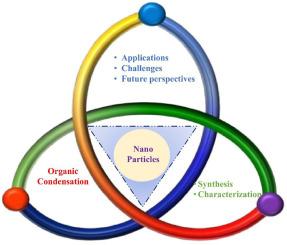纳米颗粒在有机缩合反应中的研究进展
IF 4.3
Q2 CHEMISTRY, PHYSICAL
引用次数: 0
摘要
纳米粒子由于其在纳米尺度上的独特性质,在各个领域都受到了极大的关注。纳米粒子在催化缩合反应方面发挥了重要作用,这是有机化学中必不可少的过程。所提到的评论论文深入研究了这个主题,提供了纳米粒子如何应用于有机缩合反应的深入基础。这些反应包括两个或两个以上的分子结合形成一个大分子,同时释放一个小分子作为副产品,比如水。纳米颗粒在这些反应中表现出特殊的催化性能。它们非常高效,具有成本效益,并显著加快了反应过程。与其他催化剂相比,纳米颗粒表现出显著的有效性,导致所需产品的高收率和相当短的反应时间。使用纳米颗粒作为催化剂的一个重要方面是它们对环境的积极影响。纳米催化剂的应用与环境问题是一致的。它们的使用经常减少浪费、能源消耗和对有害化学物质的需求。这使得整个合成过程更加可持续和环保。总之,综述论文提供了一个全面的概述,如何利用纳米粒子催化有机缩合反应。其优点是催化性能好,产率高,反应快。此外,使用纳米颗粒催化剂的环保意识方面使得合成方案不仅有效而且具有环境吸引力。这代表了催化和有机合成领域的一个有希望的进展。本文章由计算机程序翻译,如有差异,请以英文原文为准。

Nanoparticles in organic condensation reactions: A review
Nanoparticles have indeed gained significant attention across various fields due to their unique properties at the nanoscale. One area where nanoparticles shine is in catalyzing condensation reactions, which are essential processes in organic chemistry. The review paper mentioned delves into this topic, offering an in-depth prime on of how nanoparticles are applied in organic condensation reactions. These reactions involve the combining of two or more molecules to form a larger molecule while releasing a smaller molecule as a byproduct, like water. Nanoparticles exhibit exceptional catalytic properties in these reactions. They are exceptionally efficient, cost-effective, and speed up the reaction process significantly. In comparison to other catalysts, nanoparticles demonstrate remarkable effectiveness, leading to high yields of the desired products and considerably shorter reaction times.
An important aspect of using nanoparticles as catalysts is their positive impact on the environment. The application of nano-catalysts aligns well with environmental concerns. Their use often reduces waste, energy consumption, and the need for harmful chemicals. This makes the entire synthetic process more sustainable and environmentally friendly.
In summary, the review paper provides a comprehensive overview of how nanoparticles are harnessed to catalyze organic condensation reactions. The advantages include their superior catalytic performance, leading to high yields and quick reactions. Additionally, the environmentally conscious aspects of using nanoparticle catalysts make the synthetic protocols not only effective but also environmentally appealing. This represents a promising advancement in the field of catalysis and organic synthesis.
求助全文
通过发布文献求助,成功后即可免费获取论文全文。
去求助
来源期刊

Chemical Physics Impact
Materials Science-Materials Science (miscellaneous)
CiteScore
2.60
自引率
0.00%
发文量
65
审稿时长
46 days
 求助内容:
求助内容: 应助结果提醒方式:
应助结果提醒方式:


